Toronto lost Game 7 to Florida and there is already a lot of chatter about what should happen this summer. With John Tavares and Mitch Marner as free agents, there are clearly a couple of critical topics to cover.
One thing worth mentioning is the blue line. Writing about fantasy hockey year after year helps notice trends with teams across the league. One thing about Toronto defencemen is they just don't get involved in the offence. Consider that over the last four years, Toronto defencemen are dead last by both goals scored and shots:

On top of that, Toronto's defencemen are ninth by total assists despite the team being third by total goals in the those four years (two fewer goals than Colorado and six fewer goals than Edmonton). Teams don't need a ton of scoring from the blue line, but they do need something.
Let's put it another way. How about we rank each team's defence group 1-32 by each of total goals, assists, and shots over the last four seasons. Then we average out those ranks across the three categories. Sounds good? Here are the top six teams from the last four regular seasons:
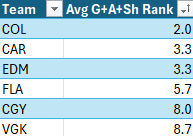
And now here are the bottom six teams by average rank across goals, assists, and shots:
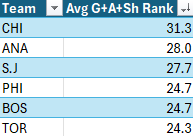
Exceptions exist but, in general, which group of teams would you want to be in? Toronto defencemen have mostly been avoidable, fantasy-wise, for years. Maybe this is a problem that extends beyond the fantasy hockey realm.
*
Still no Jalen Chatfield or Jordan Martinook at Carolina's practice on Monday:
Also, Mr. Lavalette mentioned Andrei Svechnikov took a puck to the mouth in that practice (ricochet off a crossbar) and had to be tended to. Something to keep an eye on.
*
Signs have been pointing to Edmonton defenceman Mattias Ekholm being ready to return at some point in the West Final, and it seems that day is getting close:
A reminder that something similar was happening with Miro Heiskanen, but it took over a full week for him to get back to the lineup from this point. Not that they are on the same timeline, but just because he's practicing regularly doesn't mean he'll be back on Wednesday. All the same, it's a very encouraging sign for Oilers fans.
*
In Thursday’s Ramblings last week, we looked at the changing shot, goal, hit, and block rates across the league both at 5-on-5 and at all strengths. Those things were also dissected by position, and there are some very interesting results. Be sure to check it out.
Today, let's look at something else and it's the role of younger players in the league. We are using data from Evolving Hockey and going back to the start of the 2013-14 season. We are also excluding the shortened 2019-20 campaign and the Bubble 2021 season, so there are 10 total seasons looked at here.
To start with, it's clear that teams and coaches are using younger forwards far less often than they used to. Each of the last four seasons has seen the total number of games played by attackers in their age-21 season or younger fall under 3000, after six straight seasons from 2013-2019 above 3000, and a few of them above 4000:
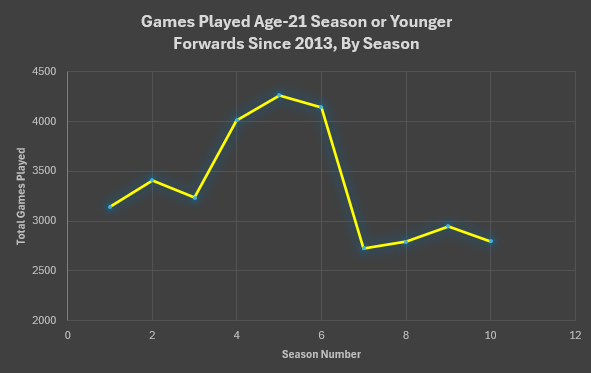
There are many reasons for this, but one theory I have seen floated (and to which I subscribe, at least partially) is that getting rid of goons for more skill at the bottom of NHL rosters makes it a higher-skill league than ever before. Because of that, it's not as easy to 'hide' young players who could have big holes in their game, particularly defensively, by sending them out against low-skilled depth players. As shown in the Ramblings yesterday, goal scoring from depth forwards is rising in recent seasons, so they can punish mistakes by younger players at a level that didn't exist 10 years ago.
Coupled with that, I will add that I think the way training has changed is a factor that feeds into the 'higher skill' narrative. While elite young players are also training year-round, the simple physiological reality is that physical strength typically peaks around the age of 25. If skilled young players can't out-skill the depth skaters from the opposition – at least not to the degree they did 10 years ago – and are physically weaker, it's even more of an uphill battle for them to be NHL regulars so early in their careers than it's ever been.
That is mirrored on defence, too. While there wasn't the large, immediate drop in 2021-22 as there was with the forwards, that did come a year later. We are now at the point where the number of games played by a defenceman in his age-21 season or younger is lower than any season from 2013-2019:
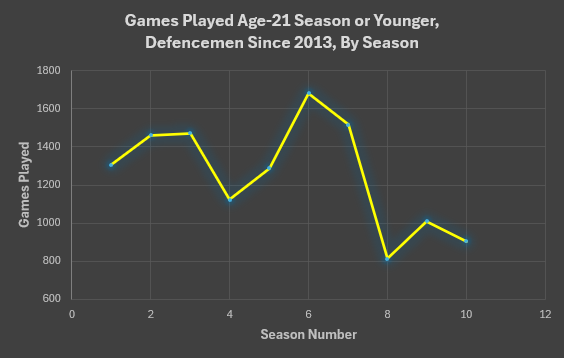
The last three seasons have seen an average of 909 games played by a defenceman in their age-21 season or younger. As recently as 2021-22, that number was 1516. In the last full 82-game season before the pandemic, that number was 1681. To put it into perspective, that gap in games played over the last three seasons compared to the three full 82-game campaigns before that works out to about seven fewer defencemen in that age range playing full 82-game seasons per year.
Clearly, players across all positions are getting fewer cracks at full seasons in the NHL than they have in recent memory. Fantasy managers in keeper or dynasty leagues would do well to keep that in mind.
If a player makes it to the NHL at a young age over the last few seasons, they are more productive than at any point in recent history. Both forwards and defencemen have produced a higher rate of points per 60 minutes across the last three seasons than the seven 82-game seasons from 2013-2022:

The caveat is that the defencemen have been far better off recently than the forwards, and that is partially due to the changing nature of the position over the last decade (we can thank Erik Karlsson's influence for that). With the last three seasons seeing 3.05 goals per 60 minutes, compared to 2.79 from the other seven seasons in the sample, goal scoring has jumped about 9.2%. Conversely, the young forwards have seen their production jump just 1% while young defencemen have improved a whopping 24.6%. So, relative to the increase in league scoring, production from young forwards has fallen but production from young defencemen has risen a lot.
The reason we looked at the last three seasons is that's when we've seen the big drop-off from games played by a defenceman, but again, those that get to the NHL have been very, very productive. That also keeps the 2021-2022 season out of the sample of recent seasons, and that was a year when Quinn Hughes (68 points), Rasmus Dahlin (53), Noah Dobson (51), and Moritz Seider (50) all reached the 50-point mark at the age of 21 or younger.
To put into perspective just how productive it is for a defenceman to reach 1.12 points per 60 minutes: In the 2024-25 season, that mark would have been 57th out of 189 regular defencemen, or around the 70th percentile. That means the average defenceman in his age-21 season or younger across the last three years has a points rate equivalent to a low-end top-pair defenceman. So, yes, while defencemen are playing far fewer games at a young age than at any point since 2013, the ones who do get there have been wildly productive.
(For posterity: If we take out Lane Hutson's season from the last three years, the points/60 rate is still 1.09, or a borderline top-pair mark. The recent surge in production from young defencemen isn't just because of one outlier season.)
This is something that fantasy managers need to keep in mind, regardless of talking one-year, dynasty, or keeper leagues. Both forwards and defencemen are reaching the NHL at a young age, at least with a consistent lineup spot, less often than at any time since the most recent lockout. However, the ones that do break that trend are very productive, and that is especially true for defencemen.
Overall, that makes relying on young fantasy defencemen a real risk/reward scenario. The number of those blue liners that can realistically make a fantasy impact in a given year is pretty low, especially compared to 7-8 years ago, but if they do break through, they are very productive.
What is concerning, of course, is ice time. Getting in a game as a 20-year-old defenceman is great, but for fantasy purposes, if that defenceman plays 16 minutes a game (hello, Brandt Clarke), then the fantasy value will be inconsistent, at best. So, while the per-minute production is there, the player's role still matters, and getting that role is as important to them as it is to any veteran fantasy skater.

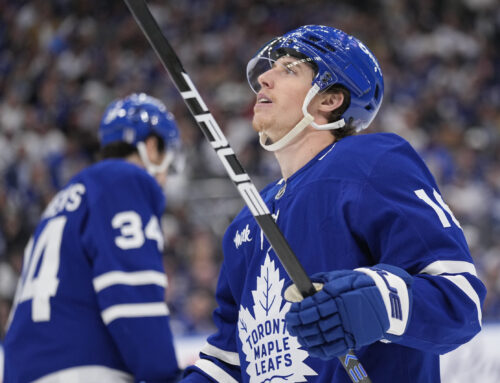
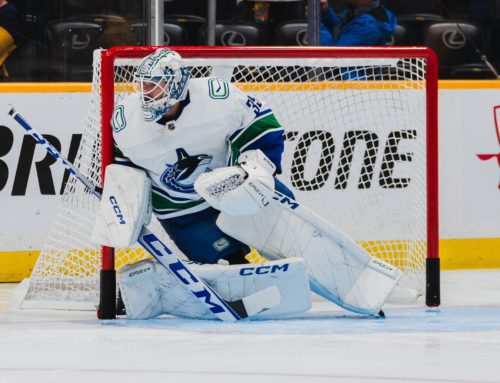
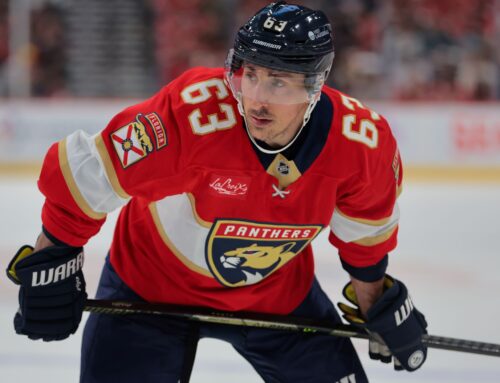
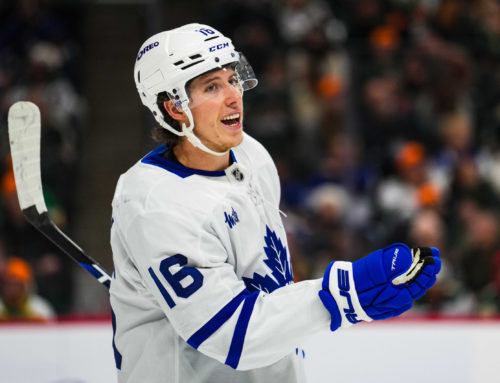
 MTL
MTL EDM
EDM
 ANA
ANA VAN
VAN OTT
OTT NSH
NSH
